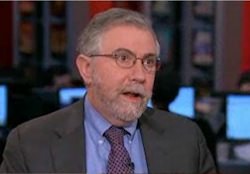Economists Behind Discredited Austerity Study Lash Out at Paul Krugman
Carmen Reinhart and Kenneth Rogoff, the Harvard economists whose influential pro-austerity study was recently exposed as being seriously flawed, have penned a scathing open letter to the New York Times columnist, who has been a major critic of their work and one of the leading voices in the anti-austerity movement.
Carmen Reinhart and Kenneth Rogoff, the Harvard economists whose influential pro-austerity study was recently exposed as being seriously flawed, have penned a scathing open letter to New York Times columnist Paul Krugman, a major critic of their work and one of the leading voices in the anti-austerity movement. In the long-winded letter posted to Reinhart’s website Saturday, the pair accuse the Nobel Prize-winning economist of “uncivil behavior” and criticize him for being “selective and shallow” in his characterization of their research.
“We admire your past scholarly work, which influences us to this day,” the letter reads. “So it has been with deep disappointment that we have experienced your spectacularly uncivil behavior the past few weeks. You have attacked us in very personal terms, virtually non-stop, in your New York Times column and blog posts. Now you have doubled down in the New York Review of Books, adding the accusation we didn’t share our data. Your characterization of our work and of our policy impact is selective and shallow. It is deeply misleading about where we stand on the issues. And we would respectfully submit, your logic and evidence on the policy substance is not nearly as compelling as you imply.”
They continue: “You particularly take aim at our 2010 paper on the long-term secular association between high debt and slow growth. That you disagree with our interpretation of the results is your prerogative. Your thoroughly ignoring the subsequent literature, however, including the International Monetary Fund’s work as well as our own deeper and more complete 2012 paper with Vincent Reinhart, is troubling. Perhaps, acknowledging the updated literature — not to mention decades of theoretical, empirical, and historical contributions on drawbacks to high debt — would inconveniently undermine your attempt to make us a scapegoat for austerity. You write ‘Indeed, Reinhart-Rogoff may have had more immediate influence on public debate than any previous paper in the history of economics.’ “
Reinhart and Rogoff then go on to defend their 2010 study, which has been widely cited by politicians and policymakers on the right in their push to enact austerity policies in the U.S., explaining where they find fault in Krugman’s criticism.
Krugman wasted no time responding to the Harvard academics, using the attack against him to once again point out the major flaws in their work.
“To some extent it lies in the downplaying of causality issues — of whether high debt causes slow growth, slow growth causes high debt, or both high debt and slow growth are the result of third factors (as was the case in demobilizing postwar America, which they highlighted in their original paper),” he writes Sunday on his Conscience of a Liberal blog for The New York Times. “But the more important sin involves the misuse of the ’90 percent’ criterion.”
He continues, “There is, as everyone in this debate has acknowledged, a negative correlation in the data between debt and growth. As a result, draw a line at any point — 80 percent, 90 percent, whatever — and countries with debt above that level will tend to have slower growth than countries with debt below that level.”
According to Krugman, however, there’s “an enormous difference between the statement ‘countries with debt over 90% of GDP tend to have slower growth than countries with debt below 90% of GDP’ and the statement ‘growth drops off sharply when debt exceeds 90% of GDP.’ ” Explaining that the former statement is true while the latter one is not, Krugman says that the pair have continued to blur that distinction even in their recent writings.
“I’m sorry, but the failure to clear up this misconception has done a great deal of harm — and this harm is not significantly mitigated by various remarks in passing to the effect that austerity might be overdone,” Krugman concludes.
Explaining why austerity is not the solution to fixing the economy has become almost routine for Krugman as of late. Recently however, his position that those types of policies been harmful to the U.S. was confirmed by the nonpartisan Congressional Budget Office — yet another indicator that his is an economic voice worth hearing.
— Posted by Tracy Bloom.
Your support matters…Independent journalism is under threat and overshadowed by heavily funded mainstream media.
You can help level the playing field. Become a member.
Your tax-deductible contribution keeps us digging beneath the headlines to give you thought-provoking, investigative reporting and analysis that unearths what's really happening- without compromise.
Give today to support our courageous, independent journalists.




You need to be a supporter to comment.
There are currently no responses to this article.
Be the first to respond.